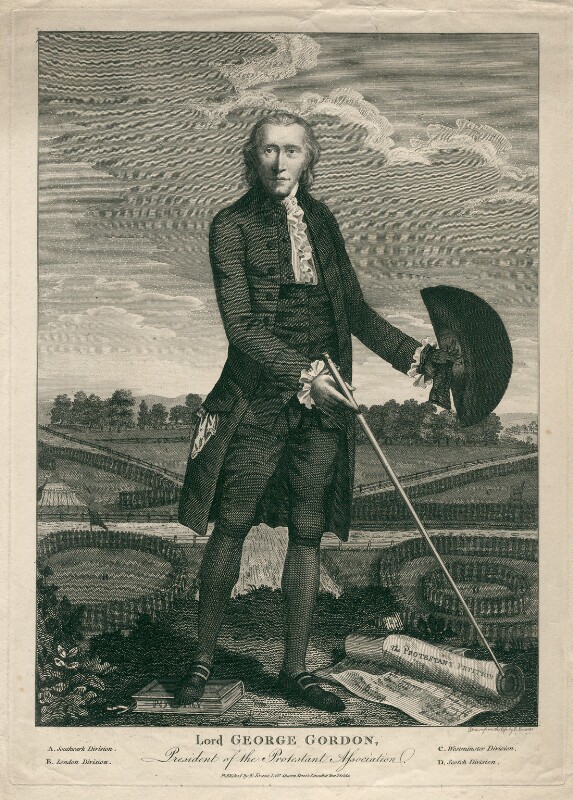Turbulent Londoners is a series of posts about radical individuals in London’s history who contributed to the city’s radical and contentious past. My definition of ‘Londoner’ is quite loose, anyone who has played a role in protest in the city can be included. Any suggestions for future Turbulent Londoners posts are very welcome. First up is Lord George Gordon, a charismatic individual who played a big role in the Gordon Riots.

after R. Bran
line engraving, published 1780
NPG D2793
© National Portrait Gallery, London
Lord George Gordon was an eccentric, irresponsible, but charismatic aristocrat who probably would have faded into obscurity if it wasn’t for the Gordon Riots, to which he gave his name. The Riots, which took place in June 1870, were a week-long series of anti-Catholic disturbances which have been called “the most serious disturbances ever seen in London.” (German and Rees, 2012; 87). Sparked by Parliament’s refusal to consider a petition to repeal the 1778 Catholic Relief Act, the riots took on a distinct anti-establishment flavour in their later days, which terrified those in authority.
Although charged with high treason after the riots, it seems that George Gordon did not intend to spark such dramatic events, which involved the largest number of people killed or executed in an episode of civil disorder either before or since (Archer, 2000). Becoming an MP with a reputation for rambling, boring speeches in 1774, Gordon was elected president of the London Protestant Association in November 1779. The Association was an organisation with the goal of repealing the Catholic Relief Act, which had relaxed some of the restrictions on Catholics in Britain.
Gordon and the Protestant Association organised a petition containing up to 100,000 signatures demanding the act be repealed. Against the advice of the rest of the Association’s leadership, Gordon called for a rally on the 2nd of June, followed by a march to Parliament where he would present the petition. An estimated 60,000 people attended, an unprecedented amount for a political meeting at this time (Bloom, 2010). The same evening that the petition was presented, two Catholic chapels were burnt down by an anti-Catholic ‘mob’. Over the following nights, the houses of many wealthy Catholics were destroyed, as well as the Langdale distillery and most of the capital’s prisons, including the infamous Newgate. Calm was not restored until the 10th of June, a week later.
At first suspected of deliberately engineering the riots, Gordon’s failed attempts to calm the situation proved he had no control over the rioters. He was acquitted of high treason, but continued to loudly voice his controversial and provocative opinions. He converted to Judaism in 1787, and was eventually imprisoned for libel following publications criticising transportation to Botany Bay as a method of punishment, and insulting Marie Antoinette, the Queen of France. He died of gaol fever in Newgate on the 1st of November 1793.
Lord George Gordon was admired by some, and considered insane by others. Whilst he was progressive in some of his views, for example his strong opposition to the death penalty, his hatred of Catholics complicates an interpretation of him as a radical reformer. However he is viewed, Gordon was a fascinating individual, who contributed to the history of disturbance in the capital, making London that bit more turbulent.
Sources
Archer J (2000) Social Unrest and Popular Protest in England 1780-1840, Cambridge: Cambridge University Press.
Bloom C (2010) Violent London- 2000 Years of Riots, Rebels and Revolts, Basingstoke: Palgrave.
German L and Rees J (2012) A People’s History of London, London: Verso.
Haydon C (2004) ‘Gordon, Lord George (1751-1793)’, Oxford Dictionary of National Biography, http://www.oxfordddnb.com/view/article/11040 (Accessed on 15.04.13).
Haywood I and Seed J (ed.) (2012) The Gordon Riots- Politics, Culture and Insurrection in Late-Eighteenth Century Britain, Cambridge: Cambridge University Press.
2 thoughts on “Turbulent Londoners: Lord George Gordon, 1751-1793”